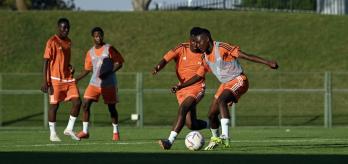Extra time has been a defining aspect of tournament football from the start – the Football Association included provision for it in its rulebook as early as 1897. Despite this, our scientific understanding of what players’ bodies go through in the additional half hour of playing time is still very limited. In this presentation, Professor Mark Russell of Leeds Trinity University explains what is really going on in extra time – and what coaches can do to prepare for it.
Key take-aways
- The physical demands associated with extra time are not well understood, but they can be measured using a combination of performance-based and physiological indicators.
- Players who play a full 120 minutes usually show a decline in physical performance during extra time. This is accompanied by physiological developments such as fuel depletion and increased muscle damage.
- Accumulated fatigue from extra time can affect players’ performance in their next match. This has implications for squad management and recovery strategies, and will therefore be of interest for coaches looking to prepare their sides for tournament football.
Watch brief
Read summary
Part 1: Background and methodology
Extra time has been part of tournament football for over a century, but the physical demands associated with it have been under-studied. To understand what happens to players’ bodies beyond 90 minutes, Prof. Russell and his colleagues analysed a range of movement-based indicators in English Premier League reserve players, including distance covered, accelerations, decelerations and vertical jump performance, to track changes over time. They combined this analysis with physiological measurements from blood samples, such as concentrations of creatine kinase (which is a marker for muscle damage), to build a picture of how extra time affects players during and after match-play.
Part 2: Results
Unsurprisingly, the researchers observed a significant increase in the total distance run during matches when those matches went to extra time – 30 minutes of extra time added approximately 3km to the total distance covered by outfield players. However, there was also a sharp decrease in explosive accelerations and decelerations compared to the preceding 90 minutes, suggesting physical fatigue was beginning to set in. This impression was strengthened by a corresponding fall in vertical jump performance and higher concentrations of creatine kinase, which can indicate muscle damage.
Part 3: Discussion and applications
The toll extra time takes on players becomes particularly obvious when a team is asked to perform again within days of playing extra time (as is common in tournament football). Players in this situation tend to show declines in both physical performance and technical accuracy. However, substitutes who have had less game time do not show the same deterioration, underlining the importance of squad management. Coaches might also consider changing players’ training schedules, diets and other relevant factors (including the use of recovery modes like ice baths, massage and compression garments) to prepare them for the possibility of extra time.
Paper citation
Russell, M., Sparkes, W., Northeast, J., Kilduff, L., 2015, “Responses to a 120-min reserve team soccer match: a case study focusing on the demands of extra time” Journal of Sports Sciences, Vol. 33, No. 20, pp. 2133–2139.















